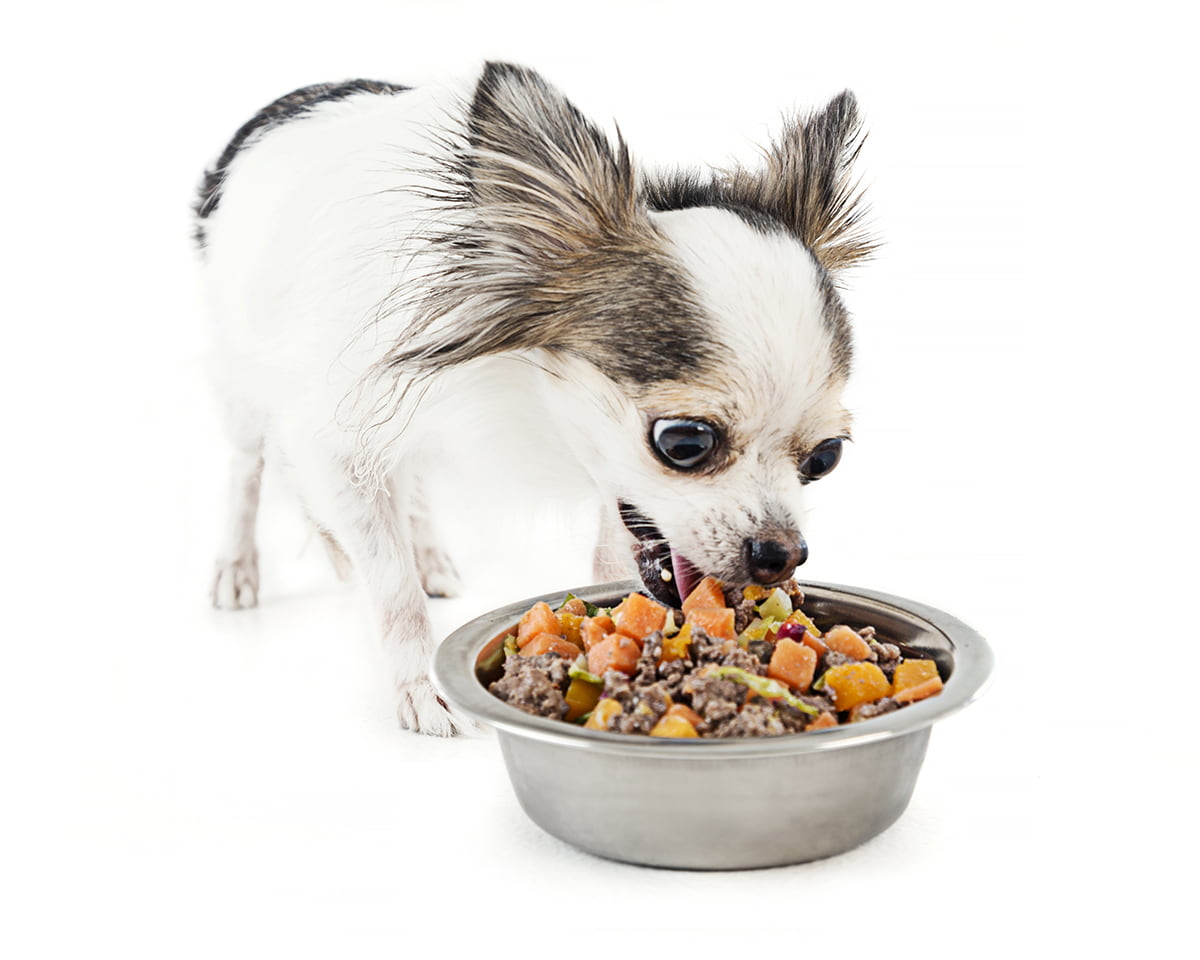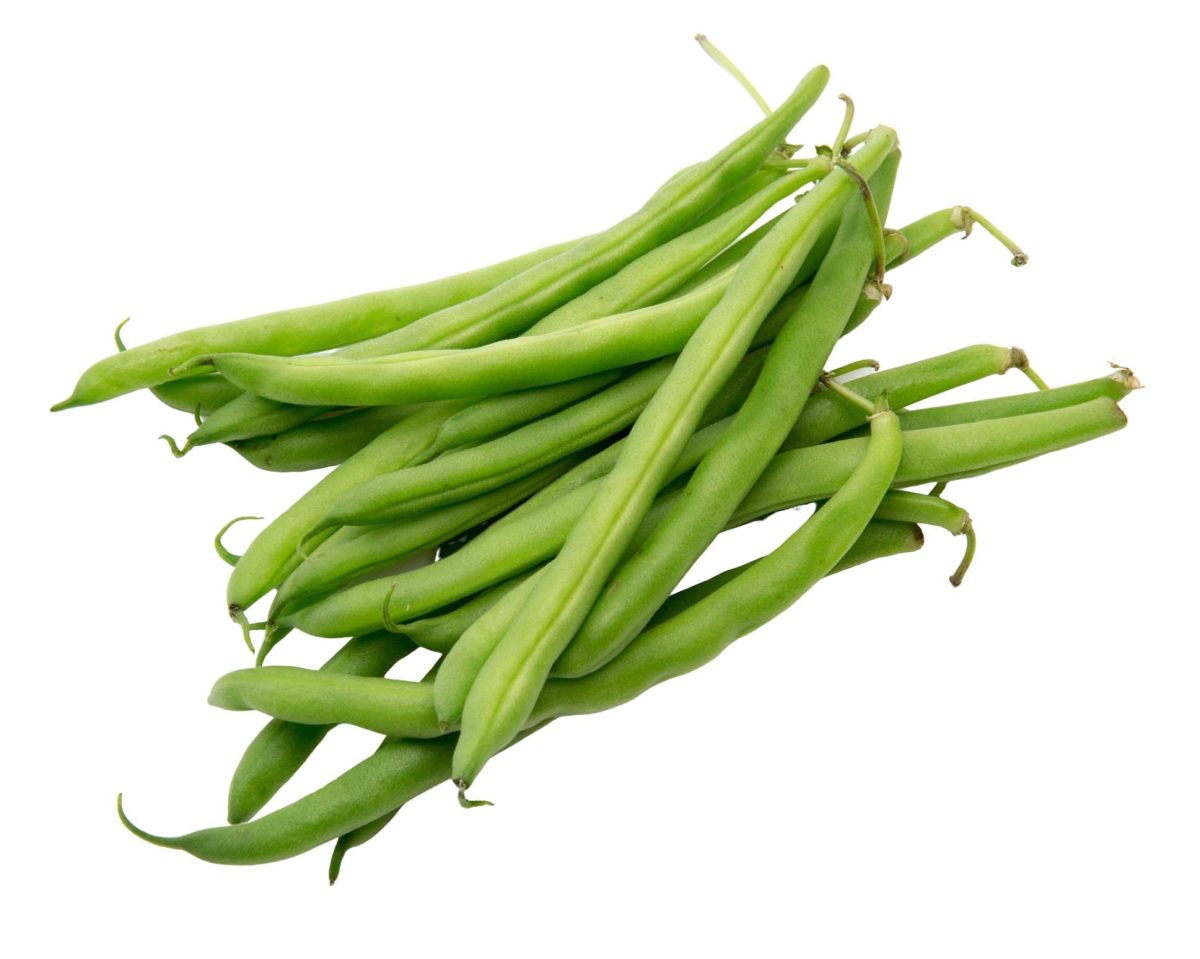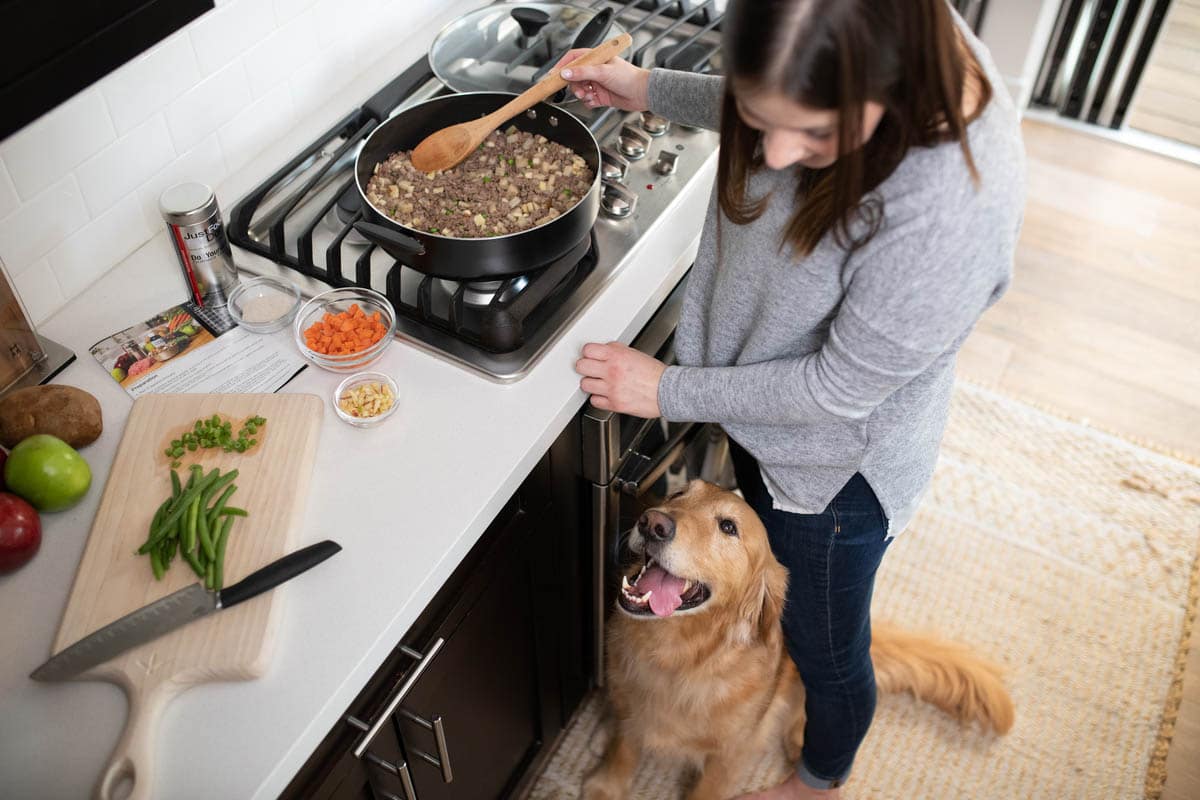Can Adult Dogs Eat Puppy Food?
Dogs have different nutritional needs during different stages of life. Here's are the nutritional differences between an adult dog, puppy, and senior.
In short: adult dogs should not eat puppy food. Dogs have different nutritional needs during different stages of life. There are countless options for dog food that can meet your dog’s needs, but can adult dogs get adequate nutrition from puppy food? Not quite.
We break down the differences between adult dog food and puppy food so you don’t have to.
Is Puppy Food OK For Adult Dogs?
Not really. While puppy food is safe for dogs at all life stages, puppies and adult dogs have different nutritional requirements. The high-calorie content of puppy food means it shouldn’t be the main source of an adult dog’s diet.
Puppies need higher-calorie food to compensate for all that they burn while they’re constantly going and growing, but feeding puppy food to adult dogs who are fully grown and less active can lead to obesity and other associated health problems.
The Difference Between Puppy Food and Adult Dog Food
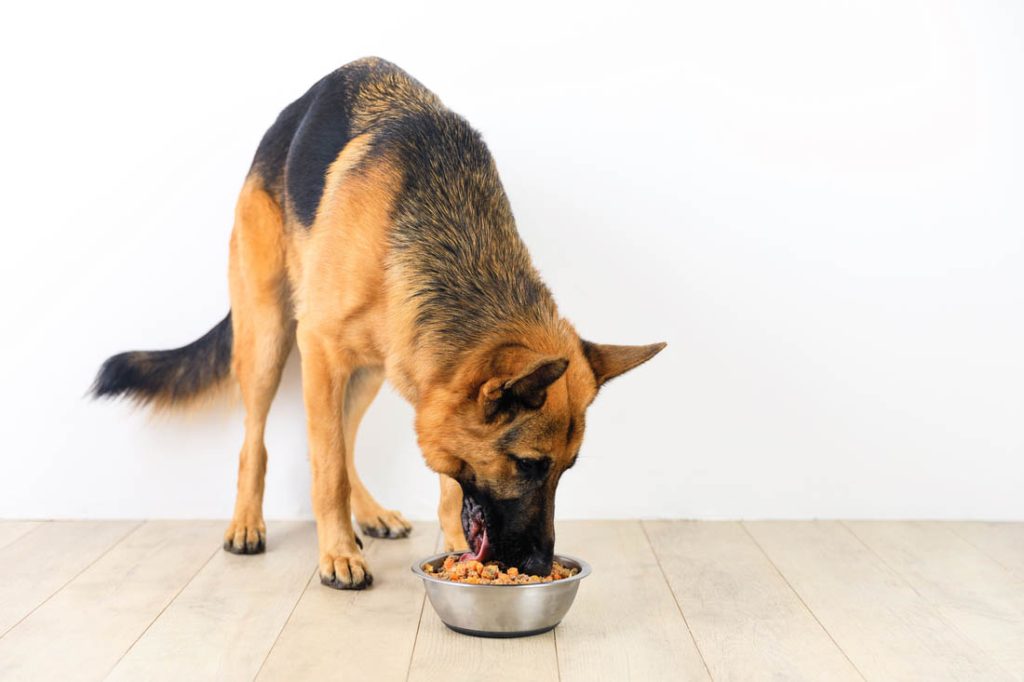
Aside from containing more calories, puppy food also has a high protein content and contains fatty acids to support the rapid growth and dietary needs of growing pups.
Dog food formulated for puppy diets also contains higher levels of nutrients like calcium, and DHA (docosahexaenoic acid), an omega fatty acid found in mother’s milk and puppy formula.
Nutritional Needs of Puppies
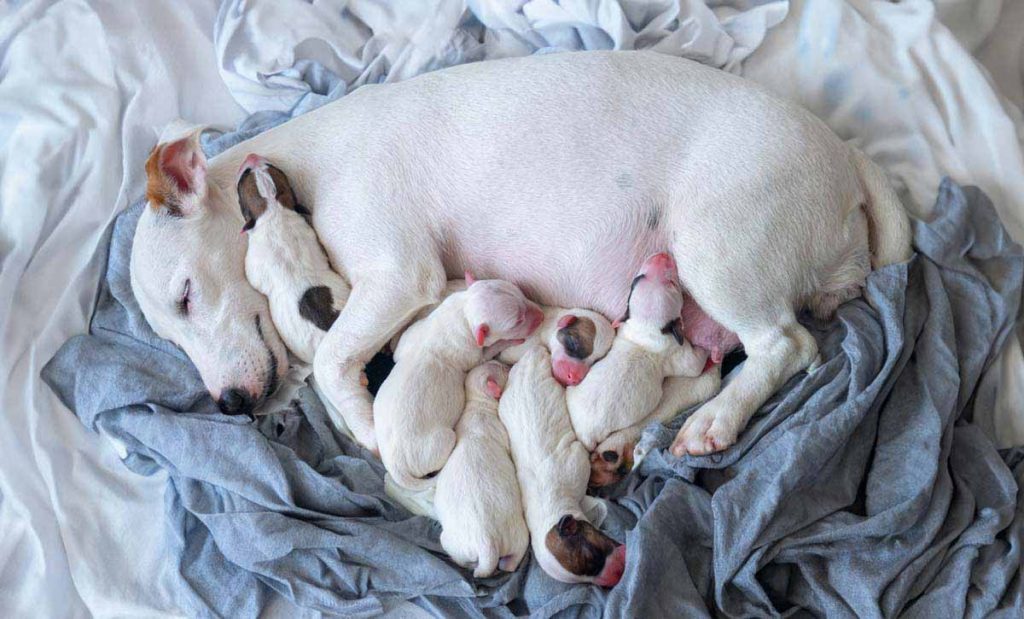
While new puppies rely on mothers’ milk or puppy formula, at around one month old they’ll be ready to transition to puppy food. Puppy food has more protein, fat, and essential nutrients to promote growth and healthy weight gain.
The Association of American Feed Control Officials (AAFCO) sets the standards for the quality and consumption of animal feed and pet food in the U.S. They state that puppies generally need food with about 22% protein and 8.5% fat.
They also need to eat more often than adult dogs, about every six to eight hours (at least three times per day) by around four to six months of age.
Nutritional Needs of Adult Dogs
As dogs mature they have different dietary needs. Older dogs don’t need as many calories or as high protein and fat content. As dogs age and reach full growth, their metabolism slows and their nutritional needs change.
The high protein and fat content found in puppy food isn’t necessary for most adult dogs and can make it difficult to maintain a healthy weight, sometimes leading to other health issues like obesity.
The AAFCO recommends adult formula dog food with about 18% protein and 5% fat for dogs over one or two years of age, and for most adult dogs to eat once or twice per day.
6 Essential Nutrients For All Dogs:
- Water
- Protein
- Fats
- Carbohydrates
- Vitamins (like vitamins A, B, D, and E)
- Minerals (like calcium, potassium, phosphorus, magnesium, iron, and manganese)
How Much Food Should Puppies Eat?
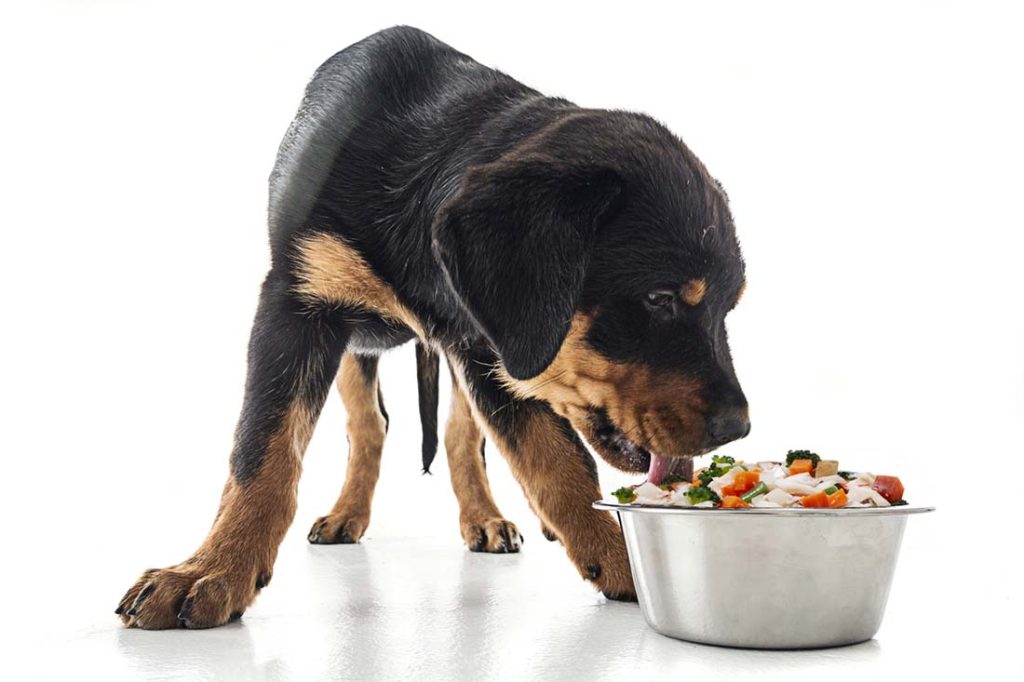
The amount of food a puppy needs depends on their exact age, activity level, and breed. After the first few weeks, a large-breed puppy, like a Great Dane, may need slightly more food than small-breed puppies, regardless of their age.
Puppies six to 12 weeks should eat wet food three to four times per day, and dry food around 10 weeks. Puppies under 20 pounds need about one to three cups of food per day spread out into several meals.
Can Puppies Eat Cat Food?
Puppies can eat cat food occasionally, but it should never be the sole source of their regular diet. Since cats are carnivores, cat kibble contains high amounts of protein and fats that can be good for growing puppies. What it’s lacking are the mixed vegetables and healthy grains that are essential for dog nutrition in adults.
How Much Food Should Adult Dogs Eat?
The dietary needs of adult dogs vary and depend greatly on age, size, breed and breed size, and activity level. Using JustFoodForDog’s Dog Food Calculator is a great way to help determine the right amount of food for your pup.
For dogs 20-50 pounds, one to five cups of food per day is more appropriate. Most dogs still considered to be in the ‘puppy’ stage won’t reach more than 50 pounds, but at that weight will eat up to nine cups of food per day.
Keep in mind that younger or more active dogs will need more calories and older or more sedentary dogs fewer to maintain healthy weight and digestion. Dogs of all ages need balanced diets made up of high-quality ingredients.
Can Adult Dogs Eat Cat Food?
Like puppies, adult dogs can also eat cat food in a pinch, but it’s nowhere near as nutritionally diverse as an adult diet for dogs should be. The high protein levels and dense calories of cat food might be good for puppies in moderation but for adult dogs, the lack of vegetables, fiber, and vitamins can cause upset stomachs and gastrointestinal issues.
FAQ: When Should I Switch to Adult Dog Food?
The right age for puppies to switch to adult dog food varies among different dog breeds. Whether or not you feed dry dog food or fresh, puppy needs are very different from those of adult-size dogs. Specific needs depend not only on breed but also on your dog’s age and size.
Smaller breed dogs who weigh 20 pounds or less can switch from their current food to new food around nine to 12 months of age. Medium breeds need a few more months of puppy food and can switch around 12 to 14 months.
Depending on their size and specific needs, large-breed dogs and giant-breed dogs may need anywhere from 14 to 24 months of puppy food to get the nutrition they need while they grow.
Should I Feed My Senior Dog Puppy Food?
Since puppy food contains high fat and protein levels, it’s not recommended for senior dogs. These extra nutrients are great for puppies wellness but can be difficult for older dogs to digest.
Circumstances where puppy food is recommended for older dogs might be to help with weight gain or nutritional shortages. In this case, it’s important for dog owners to look closely at the ingredients and ratios of the puppy food they feed their older dog and to consult their veterinarian.
This content is for informational use only and does not replace professional nutrition and/or medical advice, diagnosis, or treatment. It is not a substitute for and should not be relied upon for specific nutrition and/or medical recommendations. Please talk with your DVM about any questions or concerns.
